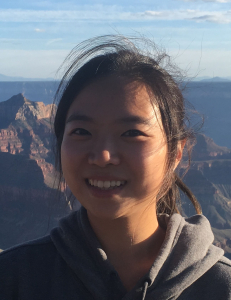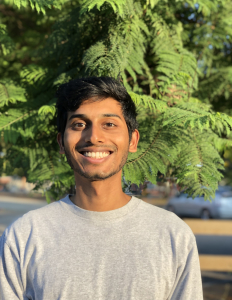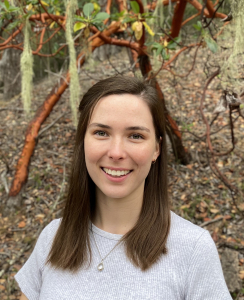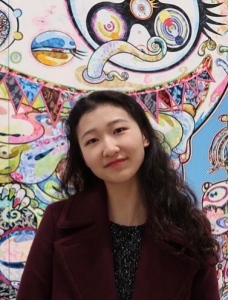2023-2024 Fowler Fellows
 Jee Yun Han is a fifth-year Gene Regulation, Epigenomics, and Transcriptomics (GREAT) graduate student in Dr. Paul Boutros’ lab. Jee Yun received a B.S. and M.S. in the Department of Biotechnology at Korea University. During M.S. studies, she studied small non-coding RNA. After her M.S., she focused on Cancer Biology and Epigenomics at Seoul National University and UCSD, respectively, as a research associate.
Jee Yun Han is a fifth-year Gene Regulation, Epigenomics, and Transcriptomics (GREAT) graduate student in Dr. Paul Boutros’ lab. Jee Yun received a B.S. and M.S. in the Department of Biotechnology at Korea University. During M.S. studies, she studied small non-coding RNA. After her M.S., she focused on Cancer Biology and Epigenomics at Seoul National University and UCSD, respectively, as a research associate.
Jee Yun‘s current research aspires to aid in developing cancer therapies through understanding the mechanism and characteristics of cancer so that, ultimately, our discoveries can be translated to the clinic. Jee Yun is focusing on the study of the extreme dysregulation of some genes that further increase heterogeneity which makes it resistant to anti-cancer therapies. These studies are expected to deepen our understanding of the impact of outliers and will allow us to identify novel cancer drivers that may comprise candidate biomarkers or potential drug targets.
 Rohith Nagari is a third year, Gene Regulation student in Peter Tontonoz’s lab. Prior to coming to UCLA, Rohith worked with Dr. Jason Sello at Brown University investigating proteolytic pathways in actinobacteria, and with Dr. Todd Golub at the Broad Institute using high-throughput tools to repurpose drugs for cancer therapy.
Rohith Nagari is a third year, Gene Regulation student in Peter Tontonoz’s lab. Prior to coming to UCLA, Rohith worked with Dr. Jason Sello at Brown University investigating proteolytic pathways in actinobacteria, and with Dr. Todd Golub at the Broad Institute using high-throughput tools to repurpose drugs for cancer therapy.
Rohith’s current research uses chemoproteomics to study cholesterol transport in cells and how this movement affects organelle and protein function. A longstanding question in the field lipid biology is how hydrophobic cholesterol crosses the aqueous cytosol to reach locations where it is stored or metabolized like the endoplasmic reticulum or mitochondrion. Using diazirine-alkyne photoaffinity labeling, Rohith will develop the first molecular-resolution map of cholesterol movement within cells.
 Alexandra Turmon is a third year Biochemistry, Molecular and Structural Biology (BMSB) graduate student in Dr. Keriann Backus’ group. She received her B.S. in Biochemistry and Molecular Biology at UC Santa Cruz where she researched cyclic peptides and the tunability of their drug-like properties to target protein-protein interactions in the lab of Professor Scott Lokey.
Alexandra Turmon is a third year Biochemistry, Molecular and Structural Biology (BMSB) graduate student in Dr. Keriann Backus’ group. She received her B.S. in Biochemistry and Molecular Biology at UC Santa Cruz where she researched cyclic peptides and the tunability of their drug-like properties to target protein-protein interactions in the lab of Professor Scott Lokey.
At UCLA, Alexandra’s research is focused on the intersection of chemoproteomic and proteogenomic methodologies to uncover druggable targets within the proteome. Recently, there has been interest in unifying transcriptomic and proteomic datasets to holistically study drivers of diseases which have been historically deemed “undruggable”. This approach is especially powerful in application to diseases arising from genetic mutations, as is the case for chromosome 3 rearranged myeloid leukemias. Alexandra’s research is focused on the development and application of N-terminal chemoproteomic tools to uncover the therapeutic vulnerabilities of these leukemias that have remained obscured by discrepancies between in vitro experiments and patient treatment. Ultimately, these findings will highlight potential pathways critical to modeling in vivo cell biology in vitro, as well as indicate potential targets for future drug development.
 Cindy Wang is a fourth year Biochemistry, Molecular and Structural Biology (BMSB) graduate student in the labs of Drs. Catherine F. Clarke and Steven G. Clarke at UCLA. She received her B.S. in Biochemistry with a Specialization in Computing at UCLA, where she studied the mechanism of organocatalytic reactions using density functional theory in the lab of Dr. Ken Houk.
Cindy Wang is a fourth year Biochemistry, Molecular and Structural Biology (BMSB) graduate student in the labs of Drs. Catherine F. Clarke and Steven G. Clarke at UCLA. She received her B.S. in Biochemistry with a Specialization in Computing at UCLA, where she studied the mechanism of organocatalytic reactions using density functional theory in the lab of Dr. Ken Houk.
For her graduate work, Cindy is employing a combination of biochemical and computational approaches to elucidate the molecular mechanism and structure-function relationship of COQ5, a methyltransferase involved in coenzyme Q biosynthesis. Defects in coenzyme Q biosynthesis lead to primary CoQ deficiency, a complex condition affecting multiple organs, as a result of the electron-carrying and antioxidant activity of coenzyme Q. Cindy is currently investigating the pathogenicity of single nucleotide variants in the human COQ5 gene in a yeast model, which will facilitate the screening and diagnosis of autosomal recessive primary CoQ deficiency.
Previous Fowler Fellows
2022 Declan Evans (Houk lab), Ashley Julio (Backus lab), Alex Stevens (Zhou lab), Cody Gillman (Gonen lab), Troy Lowe (S. Clarke lab)
2021 Weixian Deng (Wohlschlegel/Plath labs), Sean Jiang (Eisenberg lab), Maria Flores (Rodriguez lab), Carter Lantz (Loo lab), Logan Richards (Rodriguez lab)
2020 Jiahui Lu (Eisenberg lab), Callie Glynn (Rodriguez lab), Janine Fu (Loo lab)
2019 David Boyer (Eisenberg lab), John Muroski (Loo lab), Orlando Martinez (Clubb lab)
2018 Michael Hughes (Eisenberg lab), Kanishk Jain (Clarke lab), William Barshop (Wohlschlegel lab), Yuxi Liu (Yeates lab)
2017 Brendan Amer (Clubb lab), Jeffrey Vinokur (Bowie lab), Anna Sahakyan (Plath lab)
2016 Henry Chan (Feigon lab), Smriti Sangwan (Eisenberg lab), Nicholas Woodall (Bowie lab)
2014 Dan McNamara (Yeates lab), Jena Quick-Cleveland (Guo lab), Nicholas Wu (Sun lab)
2013 Alex Jacobitz (Clubb lab), Alexander Patananan (S. Clarke lab), Carly Ferguson (Loo lab)
2012 Benjamin Kuryan (Carey lab), Letian Xie (C. Clarke lab), Anni Zhao (Eisenberg lab)
2011 Timothy Anderson (Clubb lab), Ian Barr (Guo lab), Soohong Kim (Weiss lab)
2010 Zeynep Durer (Reiser lab), Rachel Senturia (Guo lab), Zurita-Lopez (S. Clarke lab)
2009 Luki Goldschmidt (Eisenberg lab), Kristofer Webb (S. Clarke lab), Sheng Yin (Loo lab)
2008 Nathan Joh (Bowie lab), Neil King (Yeates lab)








